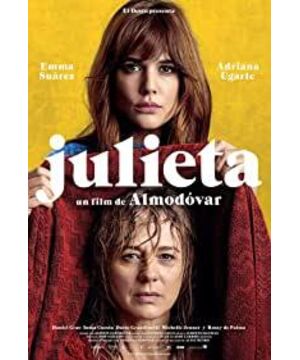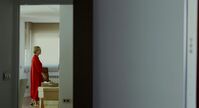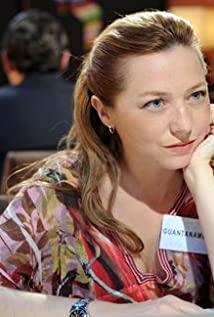(The names of the characters in the film are different from those in the novel, and the names of the characters in the film are used uniformly in the text; the words in quotation marks in the text are quoted from the original text) "Julieta" is a new film by the famous director Almodovar, and the film was shortlisted in the competition unit of the Cannes Film Festival. Watching this movie, most people probably went for Almodovar, and I was purely for Monroe. Monroe's collection of novels, "The Escape," is one of my favorites. Of course, I still don't fully understand it, but because I like it so much, I want to try to write it. "Julietta" is adapted from the three "Fate", "Hurry" and "Silence" from "Escape". At the beginning of the film, Julieta met her daughter Antia's childhood friend Bea on the streets of Madrid. After many years of hearing about her daughter, she immediately gave up the plan to move to Portugal with her boyfriend, and began frantically looking for her daughter again. Daughter Antia left Julieta at the age of eighteen, leaving no reason behind. Julieta wrote a letter to her daughter, narrating the experience of so many years, in the interspersed memory and reality, but also about her own destiny.
Julieta met Su An on the train, a fisherman whose wife was in a coma. After a night of romance, the two went their separate ways. Hu Lietta went to a school to teach classical linguistics as a substitute, and Su An returned to the beach. Afterwards, Julieta received a letter from Su An, in which Juan said that he never forgot about Julieta. Because of this letter, Julieta went all the way to find Juan. The maid told her that Su An's wife had passed away the day before, and Su An was now at another woman's house. The maid clearly said that Julieta should leave, but Julieta stayed, until Su An died in a shipwreck many years later. Why didn't Julieta go? When she taught the interpretation of the mythical figure Ulysses, she had already given the answer. Ulysses gave up everything and returned to the sea, facing all kinds of setbacks and hardships. What he longs for is adventure, the unknown. So does Julieta. To her, Su An represented the sea. Later, Julieta found out that Su An was cheating and had a big fight with him. An angry Su An went out to sea by boat and never came back. At this time, daughter Antia was far away from a friend's house in Madrid. Julieta came to Madrid and communicated the news of Suan's death to her daughter in person. Su An's death makes Julieta collapse. "She felt as if a bag of cement had been poured into her body and it set quickly. She could barely move."
Daughter Antia takes on the task of taking care of her with the help of her friend Bea. The two helped Julieta, who was lying in the bathtub, dry her body and hair. The towel is removed, and Julieta has aged in an instant (the cast is replaced by Adriana Yugart and Emma Surez).
When Antia was eighteen, she lied about going to the mountains for a retreat and never came back. For three years in a row, every year on her birthday, Antia sent home a card telling Julieta that she was still alive. "That's the kind of card you send when you can't guess the other person's tastes."
Julieta's way of dealing with problems is very fatherly. Julieta once took the young Antia back to visit her parents. She found her father locked her seriously ill mother in her room. "The doors of certain rooms in his consciousness were closed and the windows were covered - the contents of which he thought were too useless and disgraceful, so there was no need to see the light again." After Su An's death, Julieta I have never returned to my home by the sea. Ulysses in her heart could not bear the weight of reality. Many matters such as moving are handled by Antia. After the death of her mother, Julieta did not return home for several years. Because the father was with the maid who was hired to take care of the mother. The last time she went home, Julieta found the clue. She didn't want to face it, so she chose not to. After Antia left, Julieta spent another period of gloom and boundless years. Afterwards, she packed up and threw away everything related to Antia (except for a shredded photo) and moved again. "The door of this room is always closed, so that after a long time, my heart can no longer be disturbed when I pass through this door." And what about the escape of her daughter Antia? Unfortunately, Antiya's former friend Beya brought news of Antiya. Julieta has another "drug addiction". She moved back to the building where she had lived with her daughter before, she went on a frantic search, and she opened the door.
At the beginning of the film, Julieta is still dressed in fashion; after learning about her daughter, she returned to the original apartment and immediately changed her shoes to sneakers (the reason I noticed this was because I saw her in this outfit at first sight. I felt that something was wrong, and later found out that it was shoes, which were very, very inappropriate); in the end, she was haggard and even more sloppy. Beauvoir once said that clothes are important to women because they allow women to reshape the outer world and inner self at the same time through illusion. At the end of the film, Julieta meets Bea again. Bea told the truth. It turns out that Bea and Antia's relationship goes beyond friendship, and Julieta doesn't know anything about it.
Antia and Beya later had a particularly unpleasant quarrel. Beya left for New York, and Antiya chose to go to the mountains for a retreat. Seeing each other again after many years is still unpleasant. Antia said that she was ashamed of the relationship between the two, and she did not want to have anything to do with Beya.
Similar words were said by Julieta in a letter to Antia.
"This thing is your shining treasure. You don't think about it. You don't realize it's your loss for a while, and now it's something you can barely remember. That's how it tends to be. At the end of the film, Julieta receives another letter from her daughter, this time with an address. Antia had just lost a child, which gave her an insight into the pain her mother had endured. And her boyfriend Lorenzo never gave up Julieta. At the end of the film, he drove Julieta to visit his daughter. A detail in the movie hints that Lorenzo and Julieta will end up together. While waiting for Suan, who had not returned from the sea, and Antia, who had left, Julieta drank white wine.
On the night of Juan's accident, Julieta called their mutual friend, who was Juan's cheating partner. When Eva asked about Juan's whereabouts, Eva was drinking red wine. The only time Julieta drinks red wine in the film is with her boyfriend Lorenzo.
Lorenzo is Eva's friend. A sculpture of Eva is printed on the cover of a book he published. Julieta once asked Eva why she made the sculpture so heavy, and Eva replied—
The film's portrayal of Antija is not adequate. The portrayal of Julieta's mother is also lacking. This makes Julieta's character far less three-dimensional and full than in the novel. A person's overall character is composed of many small, even contradictory points, and cannot be well summarized into a few large points. In the movie, in order to highlight the character of the character, it is also because of the limitations of the image, often only focus on a few major points, choose to depict a few side sections of the character (the reason why Julieta went to Juan for a letter is far more than in the movie. account is complicated). That's the main reason I think the movie is so much less exciting than the novel. Monroe's language hides a mystery behind it. It seems trivial on the surface, but it is actually thrilling. The portrayal of the character's psychology is precise, sophisticated, and even vicious. There are words in the words, and the words are covered with words, and the characters are described as "blood dripping". Take, for example, the scene where young Julieta meets a man on the train. The man took the initiative to talk to Julieta.
She rejected him. Julieta walked out of the private room, walked to the dining car, and met Su An. The man later crashed into the train and killed himself. The film seems to express Julieta's fear of separation through this scene, but it's a bit far-fetched. And this scene plays a very important role in the book. "She will never be able to tell others about this mistake she made, this ridiculous joke. If she did, others would think she was too uneducated and too uncaring for others. And in telling, the misunderstood end—the crushed body of the suicide victim—seems no more filthy and horrific than her own menstrual blood.” Such subtle characters are difficult to create in images. It seems that only text can do this.
View more about Julieta reviews











